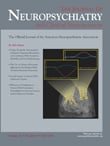To the Editor: The exposure to altered microgravity during space travel has been shown to induce changes in the limbic system which are reflected in many of the physical behaviors seen in the astronauts. Although the neurobiological basis of this phenomenon is still obscure, several psychiatric issues including anxiety, depression, psychosis, psychosomatic symptoms, emotional problems, and cognitive changes have been observed after spaceflight.
1 However, studies evaluating the impact of a microgravity environment on brain function revealed significant CNS changes, and the direct effect of microgravity has already been shown by in vivo and in vitro animal studies.
2 It has recently been shown that microgravity caused an oxidative imbalance in the hypothalamus suggesting an organic interaction between the environment and the hypothalamic-pituitary-adrenal axis.
3 This was suggested by recent animal and human studies showing significant increases of prolactin, cortisol, and ACTH levels after exposure to the microgravity environment. This concurs with recent studies showing a strong and significant correlation between circulating stress hormones, psychological status, and transient metabolic changes on the special limbic and cortical regions in humans.
Another study evaluating the neurotransmitter receptor binding and NA+, K+-ATPase activity in the limbic and cortical regions after exposure to a microgravity environment showed significantly increased 5-HT
1 receptor number in the hippocampus in contrast to a significantly depressed cortical sodium-potassium pump activity.
4 This could be related to mechanisms of structural adaptation to a decreased afferent flow in the hemisphere cortex in microgravity. This was also suggested by studies indicating inhibited cortical function in simulated microgravity conditions. These findings are interesting in light of increasing evidence regarding the functional metabolic interaction between the cortex and the limbic system by the normal regulation of mood, the development of psychiatric diseases, and the recovery from depression after treatment. Additionally, the decreased afferent flow to the hemisphere cortex can arise as a result of sensory deprivation, which can be considered an unenriched environment.
We can hypothesize that cortisol-related decreases in cortical metabolism can be a risk factor for the development of psychiatric diseases, such as hippocampal damage, which has also been shown to predispose depression. An interesting animal study revealed that animals exposed to an unenriched environment are more likely to behave like depressive animals. This is supported by studies showing that an enriched environment is capable of reversing the stress-induced disturbances and enhancing the neurogenesis.
5This finding suggests that weightlessness may affect adaptational processes not only due to weightlessness but also due to exposure to other stressors, which can mediate the psychobiological effects of the altered gravity experienced by microgravity conditions. However, the detailed underlying pathophysiological mechanism of such a possible link between stress, microgravity, and psychiatric diseases should be confirmed with further neuroimaging studies.

